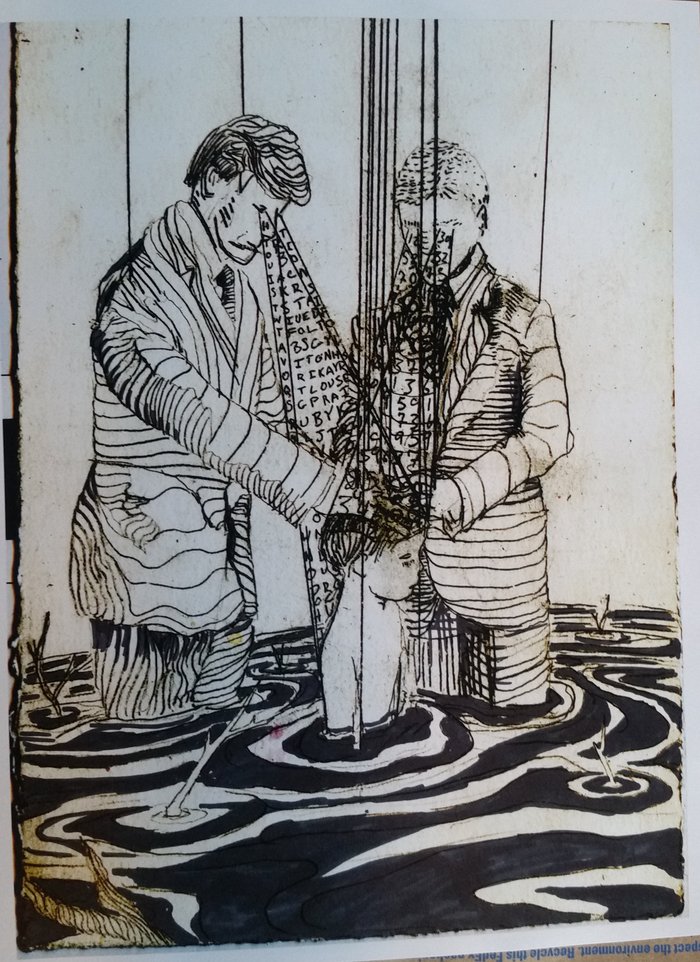
Visions
by Troy James Weaver
(Broken River Books)
Religion, sex, death, love, pain, abuse, and something akin to illuminated insanity coalesce in Troy James Weaver’s Visions, a novel that exemplifies how rich, deep narratives can benefit from both unadorned honesty and extreme economy of language. Using short chapters and a few fragments pulled from a notebook kept by the main character, Visions offers a look at a large portion of a young man’s life and the dreamlike visions and voices that take him to the edge of becoming a cult leader.
Visions kicks off with a young man remembering how he told his mother about hearing voices when he was 12 years old. From there, his life moves forward, slowly spiraling into a mixture of loss and mayhem in which the only constants are the voices that speak to him and the visions that tell him about what the future will bring. He loses his best friend, finds a strange kind of love, reads the bible, deals with his mother’s death and its aftermath, and eventually ends up on the road to a place where he’ll meet a woman who will believe in his gift, and who will plant the seed of preaching in him.
Sex and religion are two of the main cohesive elements in Weaver’s narrative, and while neither is new, he manages to make them fresh and interesting. The protagonist is the kind of obsessed individual who masturbates and then reads the Bible immediately after. While the combination is bizarre, the two things are so inextricably related in his mind and discourse that it ends up making sense and feeling natural.
A voice commands me still. I look straight above me. On the ceiling there’s a mirror duct-taped against the popcorn-white. The voice, it’s soft and high-pitched at the same time. It tells me to look at the mirror until I come to know myself. It tells me to practice with my thing in my hand. It tells me I’m dirty and alone and never going to be anything beyond the face in the mirror, the kid with the little bike and the hidden secrets. It says I need to learn to love the face in the mirror, even if the face in the mirror is unlovable. I tug on myself and smile into the mirror of myself, mouth the words “thank you” so many times my mouth starts to fill with blood.
The world in which Visions takes place is emotionally and physically gritty and the young protagonist repeatedly encounters death and suffers a long history of sexual abuse that starts at the hands of his best friend. Throughout it all, however, he retains an uncanny sense of calm that comes from the fact that he can see the big picture and his visions have taught him about the inevitability of things. While there are five characters playing important roles here, the voices quickly become as important as the main character, and the messages they bring are enough to keep readers glued to the narrative.
While the story of a up-and-coming David Koresh-like figure is enough to make this a very enjoyable novel that explores the roots of insanity and the effects of our surroundings on a developing mind, the true beauty of Visions, the element that pushes it above and beyond most other gritty contemporary narratives, is Weaver’s voice. Reading this novel made me think of entering a building I’d never been in before but finding that many rooms, colors, and angles were either familiar or contained echoes of something I knew very well. As the narrative progressed, I realized that Weaver possesses a unique voice, but one that inhabits the interstitial space between the ethereal/God-centric power of Cormac McCarthy’s Child of God and the earthy and nonchalantly philosophical prose of Brian Allen Carr’s work:
God speaks through me, I said. For a while now, I’ve been given visions and voices. Some are things that really end up happening, too. Other times they are just voices, commands. I always obey the voices. Everything has happened exactly how it has happened because I obey the voices. I’m supposed to be here. You are supposed to be with me. We are supposed to be here, together, right up until the end.
Visions is a powerful narrative that rushes forward at breakneck speed and then lingers like the blinding memory of an apparition burned into your corneas. Troy James Weaver is part of a group of new voices that are creating exciting fiction that feels simultaneously new and rooted in great classics, and this novel should help him claim that spot while landing him on the list of young authors everyone should be excited about.
Follow Vol. 1 Brooklyn on Twitter, Facebook, Google +, our Tumblr, and sign up for our mailing list.
